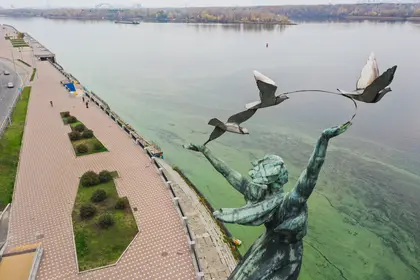Thousands of dead fish, slimy green water and a foul, swampy smell all point to one thing — the Dnipro River is slowly dying.
Recent laboratory tests found 161 pollutants in Ukraine’s largest river, which supplies water to nearly 70% of the country’s population.
JOIN US ON TELEGRAM
Follow our coverage of the war on the @Kyivpost_official.
“The ecological condition of the Dnipro basin is catastrophic,” read a subsequent report by the parliament’s Accounting Chamber on June 29.
The government is focused on reducing 19 of the most dangerous pollutants, according to Deputy Minister of Ecology and Natural Resources of Ukraine Mykhailo Khorev.
One of them is the weed killer atrazine, an agricultural pesticide that’s banned in the European Union because it’s dangerous for people and animals. The river also contains highly toxic metals like cadmium and nickel, which can cause cancer, and mercury, which is fatal in large doses.
Yet half of the list of the most dangerous chemicals consists of pharmaceutical drugs. These end up in the river as a result of people’s overconsumption, which is a lot less regulated than in western countries. The COVID-19 pandemic made things even worse — the river is now full of antibiotics, anti-inflammatory medication and steroids.
Antidepressants and antifungal drugs were also detected in water samples, according to Khorev.
“There is no such bouquet of medicines even in the Danube River, which has a bigger basin then Dnipro,” said Ruslan Havryliuk, head of the National Ecological Center of Ukraine.
The unnatural chemical mix in Dnipro creates the perfect conditions for green algal blooms, which consume oxygen vital for fish and other river inhabitants.
“Every Kyiv citizen can easily see what is happening with Dnipro — the situation is obviously critical,” said Havryliuk. “It’s only June, and the river is already green.”
Government neglect
According to the Accounting Chamber report, over the past four years, the government received $4 billion in taxes from businesses who use the Dnipro basin.
However, it spent a mere $170,000 on river infrastructure, mainly on irrigation systems for agriculturalists.
“They did nothing in key areas that determine the ecological condition of the Dnipro,” said Havryliuk. “Almost nothing was done to treat wastewater.”
According to the report, if the water quality continues to deteriorate, the state will have to spend $85 million, or 2,000 times more than it currently spends, to try to fix the vital issue.
Khorev from the ecology ministry agreed that the biggest polluters are outdated water utilities and sewage treatment plants.
“It’s 70% of the problem,” he told the Kyiv Post.
The official predicts that at least one problem will be solved in the next three years.
On June 2, the Cabinet of Ministers approved restrictions on phosphates, chemicals that see widespread use in laundry and dishwashing detergents, for both domestic and industrial use. About 90% of detergents and detergents used in Ukraine contain phosphates.
According to Ecology Minister Roman Abramovsky, last year more than 6,000 tons of phosphates were dumped into Ukrainian rivers, causing algal blooms.
“The world’s leading countries imposed similar restrictions at the end of the last century,” Abramovsky wrote on Facebook.
Underground treasure
The Dnipro had a historically low water level last year due to an extremely dry winter. But climate change doesn’t just affect the rivers — groundwater suffers as well.
“In many villages and towns, the water in wells has disappeared,” said Havryliuk. “Due to climate change, the amount of available water will decrease.”
Water well drilling is becoming a very popular business in the country amid growing water demand. But this presents a new problem — groundwater is not limitless.
“We need to prepare for less water in the country, no matter how much money we invest in it.”
Private citizens aren’t the only ones taking groundwater. Big poultry producers like MHP are doing the same.
“They don’t use the bad water from the Dnipro, but high-quality groundwater,” said Havryliuk.
Ecologist Mykola Chorniy believes that when such companies suck groundwater, villages are “doomed to extinction.”
The country is overusing its unique, strategic resources, which could ensure a supply of high-quality water for decades or centuries to come, according to Havryliuk.
As for the Dnipro, it may take decades to heal its waters.
“Unfortunately, it won’t change in the next few years,” he said.
You can also highlight the text and press Ctrl + Enter




